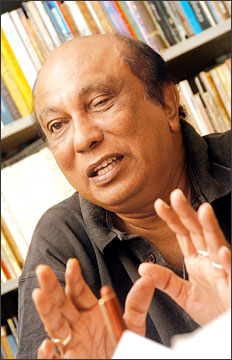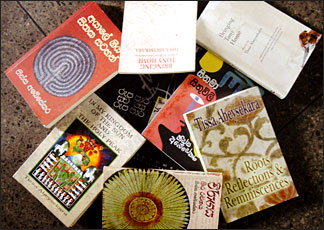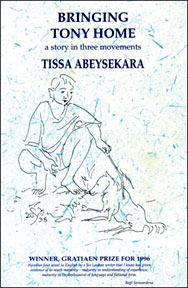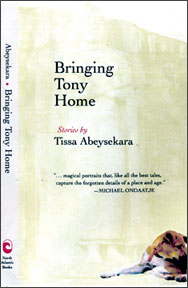Make the language your slave - Tissa Abeysekara
Time to rework lingo with regional idioms:
Sachitra MAHENDRA
|

Pictures by Ruwan de Silva |
First I stood up, and Tony paused briefly in his eating, but when
I stood still he went back to his bun, and then I took one step back,
away from him, and he didn’t notice, and another step, and then another,
and another and Tony kept eating his bun. Then turned around, closed my
eyes and ran.
I ran with the harsh mid-day sun burning all around me, past the
Ambagashatara Junction, past Manchi Akka’s boutique and never once
looking back, and by the time I reached the spot where they were putting
up the giant wheel overlooking the railway station I felt like my chest
was going to explode
- Bringing Tony Home
It was a lost classic for Michael Ondaatje as no other book has
brought him close to his lost self. When Dr Tissa Abeysekara won the
Gratiaen Prize in 1997, he really deserved the prestigious Sri Lankan
award for the best new work in English.
Bringing Tony Home is one single story in three movements evoking
that nostalgic sense of bygone days, written in rhythmic English
distinctive for Abeysekara. With a decade gone by, the much acclaimed
story is republished flanked by three other stories: Elsewhere:
Something like a Love Story; Poor Young Man: A Requiem and Hark, The
Moaning Pond: A Grandmother’s Tale
Confuse
“I have a feeling that the title might confuse the reader,”
Abeysekara opens up with hands comfortably resting on his desk - his
words flow down with a smooth poetic edge - “they will think it is the
same work, which is not.
“It so happened one day when I received a surprise mail from Mark
White of Scala House Press in the US that they have decided to publish
the book. They handled the whole process of printing and publishing the
book. It is them who have given the same title. Bringing Tony Home, I
think, attracted all age groups, whereas the three new stories will be
more likely adult-type - I mean serious reading.”
Bringing Tony Home marks the Abeysekara symbol in Sri Lankan fiction
in English. His creative concentration flows slow but steadily enough.
His sentences are sometimes long and short at times, banking wholly on
his nuances. Abeysekara no doubt comes down from a very bilingual family
settled a little away from the city.
“My conscience is precisely Sinhala. But for some reason, I find
writing in English more comfortable. Now that does not mean I am not so
with Sinhala writing. I may be more comfortable with that. Well, I will
be simply lost if you ask me which language I am more at home with.”
When sensibility seeps through, Tissa has a handle on both languages
he grew up with. Language should be reworked, his reflections call out.
“When I write, I do it the way I want. My sound patterns and rhythmic
structures are quite different. They don’t follow the way of Oxford
English.
It’s time we stop worrying too much about colonial English idioms. We
should rework the language with regional idioms and the reader will
locate our position in literature. I respect R K Narayan, the Malgudi
man, for that matter. He is one Indian who could write within the
language.”
Write within the language. So to say the language command itself does
not produce a gifted writer. Tissa Abeysekara must speak of the creative
capacity, then.
“What I think you mean by creative capacity is this. As Elliot said,
your level of observation is deeper than that of an average man, because
of creative capacity. You should have the capacity within you to recycle
it in a novel manner. In other words, you should make the language your
slave, not the other way. But you can’t just point and say that this is
creativity. It’s very, I emphasise, very mysterious.”
Sarachchandra translated his own Malagiya Ettho into English as ‘Foam
upon Stream’. Sarachchandra is well-known for his versatile creativity,
and Tissa observes it in a different wavelength.
“Sarachchandra is of course a genius when it comes to creativity.
Malagiya Ettho is no exception. I remember him tell me how Japan
influenced his creativity sparkle in the novel, but I have my doubts
whether he showed the same brilliance in the English translation. He had
a very good command of English, but there was something missing in ‘Foam
upon Stream’. I think it’s the creative tone that is missing.”
It is a universal phenomenon among the non-native writers.
Rabindranath Tagore’s creativity was dazzling, but he was a little bit
out of the language in English. It was the same with Mulk Raj Ananda who
wrote in English. But we had good English writers mainly in critical
writing. Regi Siriwardena, for Abeysekara, is the finest Sri Lankan
critic we ever had.
“In my case, I am so fond - perhaps mad - of narrative style.
Sometimes my style does not go alright with Sri Lankan audience. I take
In my Kingdom of the Sun and the Holy Peak as my coming-of-age work,
which drew a lot of attention from abroad.”
Cinema
1964 was a decisive year for Tissa Abeysekara, as he joined Lester
James Peries as a dialogue writer for Gamperaliya collaborating Regi
Siriwardena. Cinematically speaking Abeysekara is well reminisced for
his masterly performance of the historic figure, Ven Kudapola, in Puran
Appu.
His performance lasted only a few minutes but the scene of him
falling down for the white man’s gunshot will keep on striking the
spectator’s chord for generations. The man of such virtuoso recalls the
beginnings.
“In fact I did all the stuff - not only writing dialogues but I did
the tea man’s job too. But even today I am not sure at which point did I
choose filming as my career. Like any other kid, I used to watch films
since about seven years of old. You see filmgoing is fun.
We get along with others and go to a dark auditorium. And there when
the film starts screening, you are no longer under the normal
circumstances. That’s why I think, filmgoing is traditionally considered
something illicit.” He says with a grin.
Sometime in late teens, Abeysekara started seeing films seriously. He
frequented British Council and used to read ‘Sight and Sound’ magazine
and read quite a lot about filmmakers of the calibre of Ingmar Bergman.
“1960s are the upstart of my generation and the diplomatic ties
established between the then Government and the Soviet countries was a
windfall for us. Countries such as Russia, Poland and Czechoslovakia had
their film festivals here. We could see the best of Hollywood films.”
And slowly it faded away with the introduction of quota system by
National Film Corporation, which was taken as a move to protect the
local films. The Golden Period of the local cinema is nothing but
‘within quotes’ for Abeysekara.
Golden
 “I can firmly say it was not a golden period. The corporation lost
heavily. It was good for film stars, but not for the films.” “I can firmly say it was not a golden period. The corporation lost
heavily. It was good for film stars, but not for the films.”
What does this man of late sixties think of modern filmmakers? Which
makes him see them with a lighter heart. “I see three main talented
directors: Vimukthi Jayasundara, Ashoka Handagama and Prasanna Vithanage.
Vimukthi and Ashoka are not mainstream populist directors. They are
mainly experimental directors.
We have directors of this category all over the world. They are
always trying to push the boundaries. For me Ashoka is a free verse poet
in handling the camera. He is very unorthodox, whereas, to be honest, I
am a very orthodox filmmaker. Prasanna is a very good home-grown
product.
He is a superb craftsman, and in fact he knows the language of cinema
very well. Anyway it’s a little too early to pass judgment on these
young filmmakers.” However much he is acclaimed for his contribution
towards filming, Abeysekara’s interest still rests in literature.
“The demand of a writer is importantly the narrative ability. That is
equally important in both fiction and screenwriting. I was reading ever
since I could remember, and I had a real soft spot for creating stories.
Of the three films I have made, two are based on novels:Viragaya and
Karumakkarayo. Only Mahagedara I did the original script.” For that
matter Tissa Abeysekara, the simple intellectual who will turn a
septuagenarian next year, stays on being fond of literature.
Two reputed filmmakers
Tissa Abeysekara and Lester James Peries share one thing: both
started off as journalists but ended up earning reputation as filmmakers
towards the latter part of their lives.
To see Dr. Tissa Abeysekara handing over the first copy of Bringing
Tony Home and Stories to Dr. Lester James Peries at his residence last
week, is then to state the obvious. “He was one who constantly
encouraged me to keep on writing. In fact he has been privy to all these
story plots. He is the one who strongly predicted that my books will
reach international market one day. Hence I dedicate my first
internationally published book to him.” Dr. Abeysekara said.
“I have been a great admirer of his stories. I have read quite a lot
of fiction, but I find something special in Tissa’s stories. For that
reason I believed that he will reach the international market one day.
And today I am simply happy that he has achieved what I believed one
day. The book, I feel, is all about bringing Tissa home. And the dog in
the cover is lovely,” Dr. Peries commented with his smile quite
impeccable and inimitable.
  Bringing Tony Home a story in three movements Bringing Tony Home a story in three movements
The novella which won the Gratiaen Prize recounts the near-tragic
tale of a young boy who returns to his old home to find Tony, the
beloved dog his family abandoned when economic circumstances forced them
to leave. A self publication. Rs. 300.
************
Bringing Tony Home with three new stories
Elsewhere: Something like a Love Story
Two childhood lovers come together as adults briefly revisiting the
bittersweet events of their forbidden love fifteen years before.
Poor Young Man: A Requiem
The boy, as a young man, tries to make sense of his complex
relationship with his father during the years his family’s fortunes were
disappearing.
Hark, The Moaning Pond: A Grandmother’s Tale.
A much older man revisits the loss of his grandmother and experiences
a profound revelation of her place in the history and mythology of her
people.
Published by Scala House Press, Seattle, Washington and North
Atlantic Books, Berkeley, California. US$ 14.95 / $16.95 CAN
The Tissa Abeysekara timeline at a glance:
May 7 1939 Born in Maharagama, a little railroad town twelve miles
southeast of Colombo to middle-class parents who had moved from the city
to the country in the middle thirties. Not sent to school till 11 due to
poor health and tutored at home.
1952 Reveals a flair for writing early and has his first short story
published in Dinamina, a national weekly. Continues to write in both Sinhala (Mother tongue) and English to newspapers and magazines right
through the middle-teens.
1963 Gains recognition as an outstanding Film and Theatre critic in
print and radio.
1964 Joins Lester James Peries as dialogue writer and first assistant
director on Gamperaliya, which won the Golden Peacock Award for Best
Feature Film at the Third International Film Festival, New Delhi.
1965-72 Works primarily as a screenwriter authoring eight scripts for
major films and wins Best Scriptwriter Award four times annually at the
national film awards. One film scripted during this period, Nidhanaya
(Treasure), was selected the Best Film in Fifty Years of Sri Lankan
Films in 1997 by a Critics poll.
1972 Joins the Government Film Unit (GFU) as a Film Director and
works under the tutelage of the legendary German filmmaker Paul Zils,
Consultant to the Unit at the time. In addition Abeysekara writes and
directs over 40 documentaries on a variety of subjects for over 40
documentaries on a variety of subjects for the GFU.
1976 Granted special permission by the Government to direct a
Documentary for the United States Information Agency on the Life of
Colonel Henry Steele Olcott, famous American theosophist, to mark the
Bicentennial of American Independence.
1977 Makes a sensational debut as actor playing the role of a
militant Buddhist Priest in Lester James Peries’ historical epic, Puran
Appu. Wins Presidential Award for Best Supporting Actor.
1978 Directs his first full-length feature film based on an
award-winning and highly controversial Sinhala novel, Karumakkarayo,
(The Ill Fated),
1980 Leaves the GFU to become free-lance filmmaker. Writes, produces
and directs the second feature, Mahagedara (The Family Home)
1981 Mahagedara wins all the major awards including the ones for Best
Film and Best Script at the Presidential Awards. Abeysekara gets his
first award for Best Director and is awarded the Best Supporting Actor’s
award at the Sarasaviya National Film Awards.
1982 Visited Satyajit Ray in Calcutta and toured Europe.
1985 -86 Writes and Directs third feature film, based on a novel by
Martin Wickremasingha and regarded as the greatest work in contemporary
Sri Lankan fiction. Titled after the book as Viragaya (The Way of the
Lotus), the film becomes a major critical and box-office success and was
screened by special invitation at Moscow, Hawaii and New Delhi
Festivals. Viragaya sweeps all the National Film Awards in 1986.
1990 On invitation by the Goethe Institute, participated in a
retrospective of Documentary Films from the Federal republic Germany,
titled, Starting Towards Freedom held at the Max Muhler Bhavan, New
Delhi, in March.
1993 February - September, writes, produces, and directs, Part One of
a 12 hour major Television Series - Pitagamkarayo (The Outsiders), in
technical collaboration with the Sri Lanka Television Training
Institute.
1995 February - August. Writes, produces, and directs, a Television
adaptation of R.L.Spittel’s anthropological novel, The Savage Sanctuary,
based on the indigenous peoples of Sri Lanka.
1996 Wins the Gratiaen Award for the Most Outstanding Piece of
Creative Fiction by a Sri Lankan resident for his Novella, Bringing Tony
Home.
1998 Pitagamkarayo wins all the major awards at the National
Television Awards.
June 2007 Conferred D. Litt (Honoris Causa) by the University of
Colombo. |

